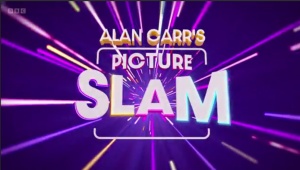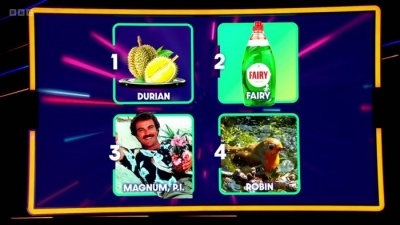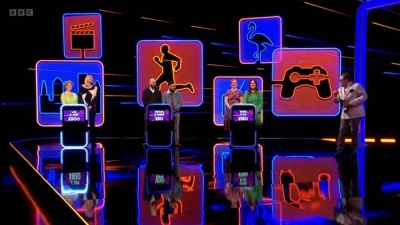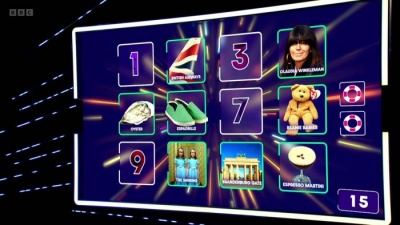Picture Slam
Contents |
Host
Broadcast
Triple Brew Media and Objective Media Group Scotland for BBC One, 16 September 2023 to present
Synopsis
Three teams face a series of pictures and each picture is worth cash. The more they can name the more they win. For the winning team, they go through to the final round where they need to name them all, and if they do that, they win £10,000.
At heart, the game is incredibly simple. The pairs of players see a series of things, and are asked to name them.
The pictures could be absolutely anything. A famous singer, like Tina Turner. It could be a branded product or logo, like Air B&B. It could be a very short clip from a television programme, like RuPaul's Drag Race. Could be a breed of dog, like a labrador. There's money for each item correctly identified, and a bonus amount for getting a "Picture Slam" – all the items on the board.
Round 1 is a board of four items for each team. £50 per right answer, with a bonus £100 for the titular Picture Slam. Wrong answers aren't penalised, players get to shout as many answers as they can, but it's all against the clock – just 30 seconds to name – those things!
Round 2 is a board of five items for each team. Still £50 per right answer, an extra £100 for the Slam, and 35 seconds to name them all. It's luck of the draw whether you get a set of pictures you know, or one you don't.
A slight change for round 3, "picture swipe". One minute to name as many things as possible. £50 for each correct answer, and a bonus £100 if you get four in a row. The chain is broken if you have to pass on any picture, and resets to zero if you complete four in a row. They come back to passes after the time expires.
The lowest scoring team after this round leaves the programme, and takes exactly no money home with them.
Two teams remain for round 4. Six pictures on the board, and the values increase markedly – £100 for a correct answer, £200 for a Slam of six. This time, players are going solo, and choose their category from four options prepared by the producers.
Our player has 45 seconds to name all six pictures. Any they don't get will be thrown over to the other side, their player will get one chance to give each of the correct answers. There's no bonus for completing the board with answers thrown over. Sometimes, the producers only accept answers that fit the category - in a board about the ocean, "Mel C" rather than "Melanie Chisholm".
After everyone has played their solo round, we have another game of Picture Swipe. Fifty seconds in total, £100 per thing, £200 per "slam" of four in a row. Just one answer per question: get it wrong, or don't answer quickly enough, and control goes to the other team. The leaders start. Whoever's got the least money after this round is out of the contest, and leaves with nothing.
Our show winners have a good wodge of cash – usually somewhere around £3000. To win the money, they need to complete the Super Slam. Twelve things, 90 seconds to name them. Eight correct answers to win the money banked in the main game. Ten correct answers to win £5000, unless you've already got it then it's £7,500. Complete all twelve to take the show jackpot of £10,000. To help, Alan will offer two Lifelines – the initial letter of each word in the answer.
Inevitably, there are comparisons to be drawn against In With a Shout; ITV's show about naming things was commissioned after Picture Slam, but came to air some months earlier. Joel Dommett is a slicker host than Alan Carr, more at home with the mechanics of the show, and he doesn't talk over the answers.
On Picture Slam, Alan asks "Who is this?" "What is this fish?" ""Which pop star is this?" - information that could be conveyed by a caption, or a short word. The programme feels stretched out - episodes are 45 minutes, with enough content for 35 minutes; in fairness, the rounds are fast-moving and relentless.
Picture Slam is a programme very young children could watch, and grandparents could watch, but we're not sure there's enough for parents.
Theme music
Banks & Wag
Web links
See also
In With a Shout, a more belligerent version on ITV.





